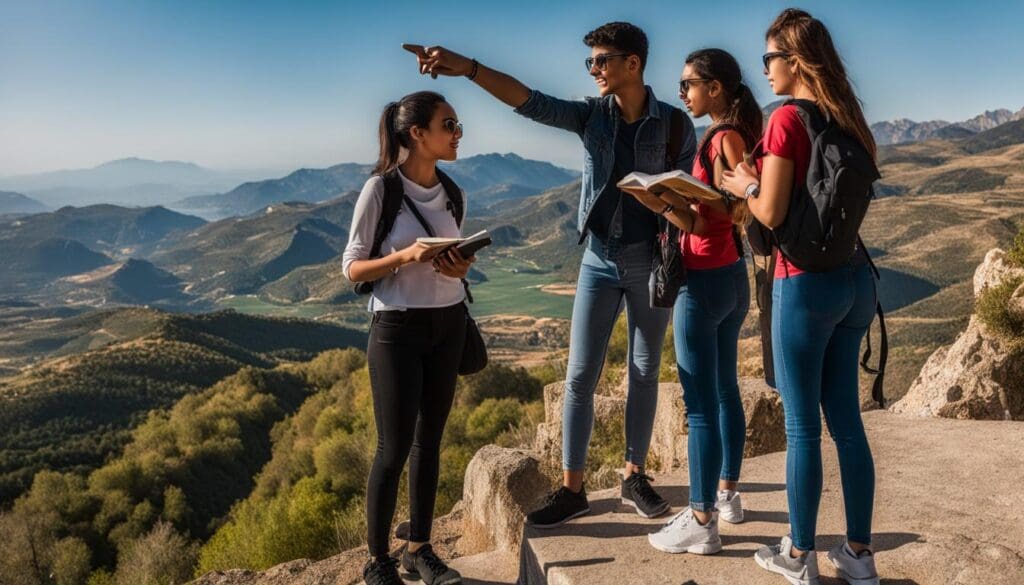Are you looking to enhance your Spanish skills and immerse yourself in the language? Spain offers a perfect blend of language learning opportunities and cultural experiences to boost your Spanish knowledge. Whether you choose to study at a language school or fully immerse yourself in the Spanish-speaking community, there are various effective ways to improve your Spanish fluency and communication skills.
Key Takeaways:
- Consider participating in Spanish immersion programs in Spain to fully immerse yourself in the language and culture.
- Language schools in Spain offer Spanish language courses that focus on conversation, grammar, vocabulary, and more.
- Engage in practical exercises like speaking and listening to enhance your fluency.
- Utilize resources such as Spanish TV shows, movies, and music to immerse yourself in the language.
- Take advantage of opportunities to speak with native speakers to practice your Spanish skills.
The Advantages of Learning Spanish in Spain
Learning Spanish in Spain offers several advantages. Immersion in the language and culture allows learners to practice speaking with native speakers on a daily basis. Being surrounded by the Spanish language helps learners improve their listening skills and become more familiar with the rhythm and cadence of Spanish. Living in Spain also provides opportunities to engage with the local community, make friends, and experience the vibrant culture. There are various language schools in Spain that offer Spanish immersion programs, intensive courses, and opportunities for language exchange.
When learning Spanish in Spain, learners have the advantage of being fully immersed in the language. This constant exposure to native speakers allows for more natural language acquisition and a deeper understanding of the culture. Immersion encourages learners to use Spanish in real-life situations, such as ordering food at restaurants, shopping at local markets, or navigating public transportation. It provides a rich learning environment where learners can practice their speaking and listening skills with confidence.
Discover the charm of Spanish at its core with Spanish Learning in Malaga, where the scenic beauty complements your journey towards fluency.
Language schools in Spain offer a variety of programs to meet the needs of different learners. Whether you prefer an intensive course that focuses on rapid language acquisition or a more relaxed program that allows for cultural exploration, there is something for everyone. These language schools often have experienced and qualified teachers who can provide guidance and support throughout the learning process. They also offer opportunities for language exchange, where learners can practice their Spanish with native speakers while helping them improve their English or another language in return.
| Advantages of Learning Spanish in Spain |
|---|
| Full immersion in the language and culture |
| Opportunities to practice speaking with native speakers |
| Better listening skills and familiarity with Spanish rhythm |
| Engagement with the local community and vibrant culture |
| Various language schools offering immersion programs and intensive courses |
| Opportunities for language exchange |
Tips for Learning Spanish Faster and Easier
Learning Spanish can be an exciting and rewarding journey, and there are several strategies to make the process faster and easier. Incorporating these tips into your language learning routine can help you improve your skills and proficiency in Spanish.
1. Learn Spanish Words in Context
Instead of just memorizing individual words, focus on learning them in context. This approach allows you to understand how words are used in real-life situations, making it easier to remember and apply them in conversations. Practice using new words in sentences and try to incorporate them into your daily conversations.
2. Master Spanish Pronunciation
Pronunciation plays a vital role in effective communication. Pay attention to the sounds of the Spanish language and practice pronouncing words correctly. Listen to native speakers, mimic their pronunciation, and use resources like Spanish pronunciation guides or language learning apps to refine your skills.
3. Immerse Yourself in the Spanish Language
One of the most effective ways to learn Spanish is through immersion. If possible, consider immersing yourself in a Spanish-speaking environment, such as studying abroad in Malaga or participating in a language exchange program. Surrounding yourself with the language allows you to practice speaking, listening, and understanding Spanish on a daily basis, accelerating your language learning progress.
4. Use Online Resources and Language Learning Apps
Take advantage of the wide range of online resources (like online spanish courses) and language learning apps. These offer interactive exercises, vocabulary builders, grammar lessons, and even opportunities to practice speaking with native speakers through virtual language exchange programs. Incorporate these tools into your language learning routine to make learning Spanish more engaging and convenient.
The Importance of Consistency and Patience in Language Learning
Consistency and patience are crucial elements in the journey of language learning. It’s important to understand that learning a new language is a gradual process that requires dedication and perseverance. While progress may not always be immediate, staying consistent with your studies and maintaining a steady pace will ultimately lead to improvement in your language skills.
Consistency allows for regular exposure to the language, which helps reinforce what you’ve learned and reinforces your memory. By consistently practicing and engaging with the language, you build a strong foundation and develop a deeper understanding of its structure and vocabulary.
Patience is equally important in language learning. It’s normal to encounter challenges and make mistakes along the way. Embracing these challenges and accepting that mistakes are a natural part of the learning process is essential. Language learning is a journey, and progress takes time. By maintaining a patient mindset, you allow yourself the space to grow and improve at your own pace.
Step into a realm of linguistic discovery with Spanish Learning in Buenos Aires, where every word is a step closer to the Argentine soul.
Remember, the key to success lies in consistency and patience. Stay committed to your language learning goals, practice regularly, and be patient with yourself. With time and dedication, you will undoubtedly make progress and achieve your desired level of fluency.


Tips for Learning Spanish with Children
Teaching Spanish to children from an early age is a wonderful way to introduce them to a new language and culture. It not only expands their linguistic abilities but also enhances their cognitive development and cultural awareness. Here are some tips to consider when teaching Spanish to children:
Create a Fun and Interactive Learning Environment
Make learning Spanish a fun and engaging experience for your children. Use colorful materials, flashcards, and age-appropriate games to keep them interested. Incorporate songs, stories, and interactive activities into your lessons to make the learning process enjoyable.
Encourage Conversation and Practice
Provide opportunities for your children to practice speaking Spanish. Engage in conversations with them in Spanish, ask questions, and encourage them to respond in the target language. Create a supportive environment where they feel comfortable making mistakes and learning from them.
Use Everyday Situations
Take advantage of everyday situations to reinforce language learning. Label items around the house with Spanish words, play pretend games in Spanish, and encourage your children to express their thoughts and feelings in the language. This will help them understand the practical applications of Spanish in their daily lives.
By implementing these tips, you can create a positive language learning experience for your children and help them develop their Spanish language skills. Remember to be patient, encouraging, and consistent in your teaching approach. With time and practice, your children will become confident Spanish speakers.


Overcoming Challenges of Learning Spanish as a Mexican-American
Learning Spanish as a Mexican-American can present unique challenges due to various factors such as growing up in English-speaking households or cultural assimilation. However, embracing one’s cultural identity and taking pride in Mexican heritage can serve as strong motivators to learn and speak Spanish. It is important to overcome the fear of sounding “stupid” or making mistakes and instead view them as valuable learning opportunities.
Consistency and patience are key in the language learning journey. It is never too late to start learning or improving Spanish language skills. By staying consistent with language learning efforts and practicing regularly, progress can be made over time. It is also helpful to find a supportive community or language exchange program where one can practice speaking Spanish with native speakers.
Embracing the challenges of learning Spanish as a Mexican-American can lead to personal growth and a deeper connection to one’s cultural roots. By maintaining a positive mindset and persevering through the learning process, fluency in the Spanish language can be achieved.


Struggles of Learning Spanish
Learning Spanish as a Mexican-American may come with its own set of struggles. Growing up in English-speaking households or communities where Spanish is not widely spoken can create a language barrier. This can make it challenging to develop fluency and confidence in speaking Spanish. Additionally, cultural assimilation may prioritize English language proficiency over Spanish, further hindering language acquisition.
Another struggle faced by Mexican-Americans learning Spanish is the fear of judgment or rejection from native Spanish speakers. This fear can prevent individuals from practicing and speaking Spanish, leading to a lack of progress in language skills. Overcoming this fear and embracing the learning process is crucial for success.
Embracing Cultural Identity
Embracing cultural identity plays a significant role in learning Spanish as a Mexican-American. By recognizing the importance of preserving and celebrating Mexican heritage, individuals can find motivation to learn and speak Spanish. Learning Spanish can be seen as a way to connect with ancestral roots, communicate with family members, and fully participate in and appreciate Mexican culture.
Embracing cultural identity also involves being proud of one’s linguistic diversity and recognizing the value of bilingualism. Rather than feeling pressured to assimilate completely, Mexican-Americans can embrace their unique cultural background and use it as a source of strength in the language learning process.
| Struggles of Learning Spanish as a Mexican-American | Ways to Overcome Challenges |
|---|---|
| Limited exposure to Spanish-speaking environments | Seek out opportunities to immerse in Spanish-speaking communities, join language exchange programs, and engage in conversations with native speakers. |
| Fear of judgment or rejection | Build confidence through practice, embrace mistakes as learning opportunities, and remind oneself of the cultural importance of learning Spanish. |
| Pressure to assimilate to English-speaking culture | Value and prioritize bilingualism, surround oneself with Spanish language resources, and actively seek to maintain and strengthen connections to Mexican heritage. |
Learn Spanish through Reading and Watching Movies
Reading Spanish books and watching movies in Spanish are effective methods to enhance language proficiency and immerse oneself in the Spanish language and culture. These activities provide opportunities to expand vocabulary, improve reading comprehension, and develop listening skills.
When it comes to reading, choose Spanish-language books that suit your level of proficiency. Start with simple, easy-to-understand texts and gradually progress to more complex literature as your language skills improve. Reading out loud helps with pronunciation and developing a natural flow of speech. Additionally, it is beneficial to have a dictionary handy to look up unfamiliar words and phrases.
Watching movies in Spanish with subtitles is a great way to improve listening comprehension and familiarize yourself with different accents and colloquial expressions. Begin by watching movies with English subtitles, then transition to Spanish subtitles, and eventually challenge yourself to watch without any subtitles. This progression allows for gradual improvement and a deeper understanding of the language.
Here is a table summarizing the benefits of learning Spanish through reading and watching movies:
| Benefits of Learning Spanish through Reading and Watching Movies |
|---|
| Expands vocabulary |
| Improves reading comprehension |
| Enhances listening skills |
| Exposes learners to different accents and colloquial expressions |
| Allows for gradual progression in language proficiency |
Remember, learning Spanish through reading and watching movies should be an enjoyable and engaging experience. Choose materials that interest you and make the most of the opportunities to immerse yourself in the Spanish language.
Tips for Learning Spanish Conversation Skills
Developing strong conversation skills is essential for speaking Spanish fluently. Here are some tips to help you improve your ability to engage in meaningful conversations in Spanish:
- Speak Spanish as much as possible: Practice is key when it comes to language learning. Challenge yourself to speak Spanish in everyday situations, even if you feel uncomfortable or make mistakes. The more you practice, the more confident you’ll become.
- Record and listen to yourself: Use a voice recorder app on your phone or computer to record yourself speaking in Spanish. Listen to the recordings to identify areas that need improvement, such as pronunciation or grammar, and work on those specific areas.
- Engage in conversation with native speakers: Find opportunities to have conversations with native Spanish speakers. This could be through language exchange programs, online language forums, or joining conversation groups. Speaking with native speakers will expose you to different accents and improve your ability to understand and respond in real-time.
Remember, language learning is a gradual process, and it’s okay to make mistakes along the way. Embrace the learning journey, stay consistent with your practice, and soon you’ll find yourself speaking Spanish fluently.


Example Dialogue:
Student: Hola, ¿cómo estás?
Native Speaker: ¡Hola! Estoy bien, ¿y tú?
Student: Estoy bien, gracias. ¿Qué has hecho hoy?
Native Speaker: Hoy he ido al trabajo y después he quedado con unos amigos. ¿Y tú?
Student: Yo he tenido clases por la mañana y ahora estoy practicando mi español.
Native Speaker: ¡Eso es genial! Si tienes alguna pregunta, no dudes en preguntarme.
Student: Muchas gracias, lo aprecio. ¿Te gustaría practicar un poco de inglés también?
Native Speaker: ¡Claro! Estoy abierto a aprender y practicar diferentes idiomas.
Benefits of Language Immersion in Spain
Language immersion is one of the most effective methods to learn Spanish, and there’s no better place to immerse yourself in the language than Spain. Spanish language immersion programs in Spain offer a unique opportunity to fully immerse yourself in the language, culture, and daily life of Spanish-speaking communities. By living and studying in Spain, you can experience the language in its natural context and gain a deeper understanding of the Spanish culture.
One of the key benefits of language immersion in Spain is the opportunity to interact with native speakers on a daily basis. This constant exposure to the language allows you to practice your speaking and listening skills in real-life situations. Conversations with locals, ordering food at restaurants, and navigating daily life in Spanish all contribute to a rapid improvement in fluency.
Moreover, language immersion in Spain provides a cultural enrichment that goes beyond language learning. You have the chance to explore historic landmarks, participate in local traditions, and make connections with people from different backgrounds. This cultural immersion enhances your understanding of Spanish customs and traditions, making your language learning experience more meaningful and well-rounded.
Benefits of Language Immersion in Spain:
- Full immersion in the Spanish language
- Daily interaction with native Spanish speakers
- Rapid improvement in fluency
- Cultural enrichment and understanding
- Opportunities to explore historic landmarks and local traditions
Whether you choose to participate in a Spanish immersion program or simply live in Spain for a period of time, the benefits of language immersion are undeniable. It’s an immersive and engaging way to learn Spanish, and the skills and experiences you gain will stay with you long after you leave Spain.


Language Courses in Spain
If you’re looking to learn Spanish and immerse yourself in the language and culture, Spain is the perfect destination. With its rich history, vibrant cities, and welcoming locals, Spain offers a wide range of language courses to suit every learner’s needs. Whether you prefer to study in a traditional classroom setting or take advantage of online platforms, there are language schools in Spain that provide intensive Spanish courses designed to enhance your language skills.
One such language school is Vamos Academy, located in Malaga, Buenos Aires, and also offering online courses. Vamos Academy is dedicated to providing high-quality Spanish language education to students of all levels. With experienced teachers and a communicative approach to learning, their courses focus on conversation, grammar, vocabulary, listening, reading comprehension, and writing.
At Vamos Academy, you’ll also have the opportunity to participate in Spanish immersion programs, where you can practice your language skills with native speakers and gain a deeper understanding of Spanish culture. These immersive experiences allow you to fully immerse yourself in the language and improve your fluency at a faster pace.
So, whether you’re looking to study in Spain in-person or remotely, Vamos Academy is your go-to language school for Spanish language courses. Start your Spanish immersion experience with Vamos Academy and take the first step towards improving your language skills!


Benefits of Studying at Vamos Academy:
- Experienced teachers who are native Spanish speakers
- Small class sizes for personalized attention
- A communicative approach to learning, focusing on practical language skills
- Opportunities for language exchange with Spanish speakers
- Immersive experiences to practice Spanish in authentic contexts
- A supportive and friendly learning environment
“Studying at Vamos Academy has been a game-changer for my Spanish language skills. The teachers are passionate, the classes are engaging, and the immersive experiences have really helped me build my confidence in speaking Spanish.” – Maria, former student
Conclusion
Improving your Spanish language skills requires time, dedication, and effective strategies. By incorporating daily activities such as reading, watching movies, and labeling items in Spanish, you can significantly enhance your language learning journey. Embracing challenges, staying consistent, and being patient are key factors in achieving fluency.
Immersing yourself in the Spanish language and culture, whether through living in Spain or participating in language courses, provides invaluable opportunities for rapid improvement. Vamos Academy, your Spanish Language School in Malaga, Buenos Aires, and Online, can help you start your Spanish immersion experience. Their intensive Spanish courses and communicative approach ensure a comprehensive learning experience.
Remember that learning a language is an ongoing process. With motivation and perseverance, you can master the Spanish language and enjoy the many benefits it brings. So, embark on this exciting journey and watch as your Spanish language skills flourish!
FAQ
How can I improve my Spanish knowledge in Spain?
Immersion in the language and culture of Spain through activities like language exchange programs, living with native speakers, and enrolling in Spanish language courses can greatly enhance your Spanish skills.
Are there Spanish immersion programs available in Spain?
Yes, there are various language schools in Spain that offer Spanish immersion programs, which provide intensive language courses and opportunities to practice speaking with native speakers on a daily basis.
Where can I study Spanish in Spain?
There are many language schools in Spain, particularly in cities like Barcelona, that offer Spanish language courses for learners of all levels. These courses focus on conversation, grammar, vocabulary, and reading and writing skills.
What are the best ways to learn Spanish in Spain?
Some effective ways to learn Spanish in Spain include immersing yourself in the language and culture, engaging in conversations with locals, participating in language exchange programs, and attending language courses that emphasize communication skills.
How can I learn Spanish faster and easier?
Incorporating Spanish into your daily routine by listening to Spanish music, reading Spanish books, watching Spanish movies, labeling items in your home with Spanish words, and practicing pronunciation can help accelerate your language learning journey.
How important is consistency and patience in language learning?
Consistency and patience are key factors in language learning. It is important to have a regular study routine and be patient with your progress, as learning a language is a gradual process.
How can I teach Spanish to children?
Engaging children in fun and interactive activities like reading Spanish books out loud, watching Spanish movies, and playing language learning games can help develop their Spanish language skills from an early age.
What are the challenges of learning Spanish as a Mexican-American?
Mexican-Americans may face challenges in learning Spanish due to growing up in English-speaking households or cultural assimilation. However, embracing their cultural identity and taking pride in their heritage can motivate individuals to learn and speak Spanish.
How can I improve my conversation skills in Spanish?
Practicing speaking Spanish as much as possible, even if it feels imperfect, and engaging in conversations with native speakers can help improve your conversation skills. Recording and listening to yourself, repeating phrases, and accepting mistakes as part of the learning process are also helpful.
What are the benefits of language immersion in Spain?
Language immersion in Spain provides the opportunity to interact with native Spanish speakers on a daily basis, accelerate language learning, and gain a deeper understanding of Spanish culture and traditions.
Are there language courses available in Spain?
Yes, there are numerous language schools in Spain that offer Spanish language courses for learners of all levels. These courses focus on various aspects of language learning, such as conversation, grammar, vocabulary, listening, reading, and writing.
How can I improve my Spanish language skills?
Consistency, patience, and incorporating Spanish into your daily routine through various activities like reading, watching movies, and engaging in conversations are key to improving your Spanish language skills.




